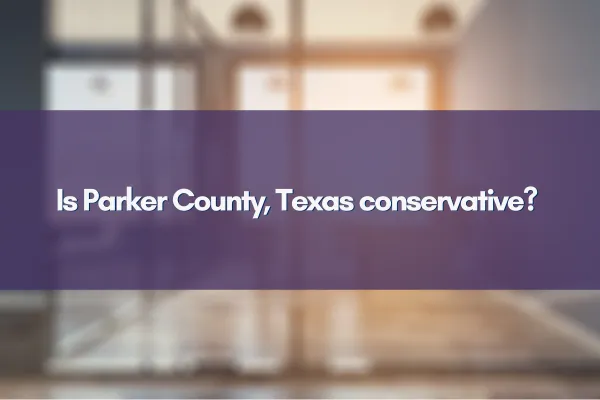BLOG

Is Parker County, Texas conservative?
Is Parker County, Texas Conservative?
If you’ve ever asked yourself, “Is Parker County, Texas conservative?”, you’re not alone. Nestled on the western edge of the Dallas-Fort Worth Metroplex, Parker County holds a unique position in Texas politics—and understanding it might just unveil more than you expect about suburban politics in the Lone Star State.
Let’s dive into the real story—backed by data, sprinkled with humor, and framed in a storytelling style that channels the innovation and clarity of Steve Jobs, combined with the savvy SEO optimization à la Neil Patel. Ready? Great, let’s unlock the secrets of Parker County, TX political leaning.
The Political Pulse of Parker County, TX
Imagine Parker County as a steadfast anchor in a sea of shifting political tides. Historically, it has leaned conservative, and not just by a whisker—but by a ton. Local voting data and presidential election results reflect a strong preference for Republican candidates, consistently favoring conservative policies and representatives.
Why conservative? Let’s break it down:
Historical voting patterns:
Parker County has rarely deviated from voting Republican in statewide and national elections for decades. In fact, no Democratic presidential candidate has won Parker County since 1976. That’s almost half a century of political consistency.Population and demographics:
The county, with a population of approximately 142,000 (as of the 2020 census), is largely suburban-rural. Areas like Weatherford and Aledo are known for a community that traditionally values conservative ideals such as limited government, low taxes, and personal responsibility.Economic factors:
The economy in Parker County is diversified, with a strong presence in agriculture, manufacturing, oil and gas, and retail sectors. Conservative economic policies that favor business development and lower regulation tend to resonate here.
Cultural and Social Climate in Parker County
When you drive through Parker County, it’s hard not to notice the values deeply rooted in community life. At its heart, this is a community proud of its Texan heritage, where conservative ideals intersect with local traditions. While there's room for diverse opinions—as in any vibrant community—the overwhelming political leaning is conservative.
Key social influencers:
Faith and community organizations: Churches and religious groups play a pivotal role, often fostering conservative viewpoints.
Local leadership: City and county officials mostly come from conservative backgrounds, reinforcing policies aligning with conservative principles.
Media influence: Local news and radio tend to reflect and amplify conservative voices, contributing to community engagement around these values.
How Suburbanization Influences Parker County Politics
Here’s a fascinating twist: suburban counties around big cities sometimes swing politically as new residents move in. However, Parker County’s political leaning has remained remarkably stable. Why?
Selective Migration: Many newcomers moving to Parker County come from similarly conservative areas.
Community cohesion: The county maintains a strong sense of identity, and newcomers often embrace existing values.
Economic development: Growth in business and housing development encourages policies that limit heavy regulation, popular in conservative platforms.
Debunking Myths: Parker County Isn’t Just “Red” – It’s Nuanced
So, is Parker County, Texas conservative? Let’s be clear: yes, but with nuance. While the majority leans conservative, individual beliefs vary, showing a healthy diversity of thought. The county doesn’t fit into a rigid political box, and the future might hold shifts as demographics evolve.
Still, it’s tough to argue against the strong conservative backbone here, making Parker County a classic example of suburban Texas politics.
Quick Facts About Parker County’s Political Landscape
Consistent Republican Voting: Dominates presidential and statewide elections for 40+ years.
Strong Conservative Values: Emphasis on limited government, free enterprise, and traditional social values.
Suburban-Rural Blend: Economy and demographics that favor conservative economic policy.
Community & Faith: Religious groups significantly influence political preferences.
Political Stability: Despite Dallas-Fort Worth growth, Parker County remains reliably conservative.
Survey Says: What Residents Think
While official data leans conservative, informal surveys show many residents appreciate pragmatic governance, focusing on tax policies, infrastructure, and education funding—without obsessing over party labels. There’s a dash of healthy political debate behind the scenes!
FAQs About Parker County, TX Political Leaning
Q1: Has Parker County ever voted Democratic in recent history?
A1: The last time Parker County voted for a Democratic presidential candidate was in 1976. Since then, it has been a Republican stronghold in presidential and many statewide elections.
Q2: Does suburban growth threaten Parker County's political leaning?
A2: While growth introduces diversity, so far, new residents typically align with the county’s existing conservative culture, maintaining political stability.
Q3: Are local elections in Parker County also dominated by conservatives?
A3: Yes, city and county commissions generally feature conservative candidates, reflecting voter preferences.
Q4: How can I learn more about schools and districts in Parker County?
A4: Parker County is served by several school districts like Weatherford ISD, Aledo ISD, Willow Park ISD, and more. For detailed information on school ratings, visit GreatSchools.org.
To Boldly Go Into Parker County
Understanding Parker County’s political leaning gives you a lens into the broader story of Texas suburbs—balancing tradition and growth, values, and community dynamics.
Whether you’re a newcomer, investor, or just a curious Texan, knowing the political climate prepares you to engage more meaningfully with your community and local governance.
And remember, political leanings are just one piece of the pie that makes Parker County special. Dig deeper, and you’ll find a vibrant community with exciting opportunities and rich traditions.
Ready to Explore Parker County, TX? Let’s Connect!
Thinking about making Parker County your home or investment hub? As a Realtor specializing in this area, I’d love to help unlock the best options for your needs—politics aside!
📞 Contact: Kelli Boyd
📍 Title: Realtor
📲 Phone: 817-374-5151
📧 Email: [email protected]
🌐 Website: kelliboydrealtor.com
If you enjoyed this deep dive, share your thoughts! How do you feel about Parker County’s political landscape? Comment below or share this post to keep the conversation going. Because understanding where you live isn’t just smart—it’s powerful.





